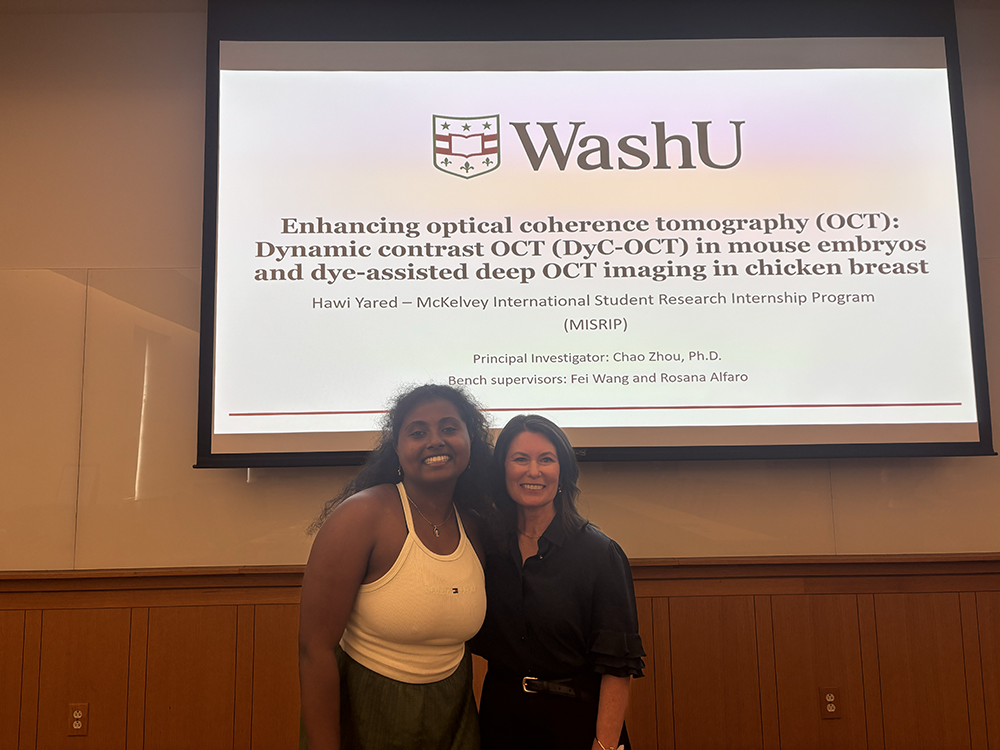Hawi's placements: Washington University, Missouri and University of Edinburgh

Integrated Natural Sciences student Hawi spent her summer on two research placements exploring developmental biology. Through the McKelvey International Student Research Internship Program (MISRIP) at Washington University in St Louis, she worked on biomedical imaging, while her URSS-supported placement at the University of Edinburgh focused on limb development in chick embryos. These experiences strengthened her technical skills, broadened her research interests and confirmed her ambition to pursue a PhD in developmental biology. Here, she tells us more.

Tell us about your placements and what attracted you to them
I was fortunate enough to have two placements lined up for me this year. I was selected to partake in the McKelvey International Student Research Internship Program (MISRIP) at Washington University in St Louis (WashU), Missouri, to work with Professor Chao Zhou’s lab on optical coherence tomography and its imaging applications using mouse embryos and chicken tissues. I was initially introduced to the internship through one of my professors, who had previously visited the university and learned about the program. My second placement was made possible by the Undergraduate Research Support Scheme (URSS), which supported a project in Megan Davey’s lab at the University of Edinburgh, examining limb development in chick embryos with a specific focus on TALPID3 and its role in digit outgrowth.
My goal for this summer was to play ‘developmental bingo’ and gain as much experience with different biological models as I could. With my dissertation last year being on human embryonic stem cells and my current master’s thesis on zebrafish, I thought I could gain some transferable skills. My work at WashU was more focused on biomedical engineering, which required different skills to learn and provided the ability to work with the technology that could answer some of developmental biology’s biggest questions. My work at Edinburgh was more aligned with my previous skillset and was a chance to further hone my lab skills and learn more about the principles of developmental biology.
What was the first thing you did as part of the placements?
At WashU, it was learning how to code in MATLAB. I had some previous experience with coding in Python and R, so having an additional coding language was beneficial. In Edinburgh, it was learning to correctly stage chick embryos. We typically worked with stage 12-14 embryos, in which I learned to conduct in ovo electroporation in the limb bud and neural tube of embryos.
What did you learn during the placement?
I learned not to be so scared to ask for help! All the PIs and PhD students I managed to meet were extremely helpful and were so willing to answer any questions that I had.
Did you have the opportunity to enjoy any experiences outside of the labs?
The MISRIP program organised a trip to the St Louis Cardinals Game, where I watched baseball for the first time! During the weekends, I travelled to Houston, Chicago, and Indianapolis, while also enjoying the local activities in St Louis. One of my favourite things to do was go to the local outdoor theatre called The Muny, where they held shows every week for several plays. My favourites were Evita and La Cage aux Folles, and the best part was that tickets were free!
It was my first time in Scotland ever, so seeing how beautiful Edinburgh is was definitely a treat. I also had the chance to do some hiking up Arthur’s Seat and visit Glasgow. I had the best opportunity to travel across the US and Scotland. I visited so many different cities in such a short period of time. I would say I made the most of those weekends I had off!
What did you enjoy most?
I loved working with the chick embryos. They can be frustrating at times, but also extremely rewarding when they’re successful. I also had the chance to get some teaching experience with some Honours students up at Edinburgh, where we demonstrated how to window some eggs. It was fun to inspire some people to get into anatomy/developmental biology.
How do you think the experience helped you?
I think it gave me the confidence I needed to convince myself that I was capable enough to do a PhD. I always felt that I wasn’t smart enough to do one. However, a lot of research is working in the unknown, and failure is somewhat encouraged!
Has this changed the way you think about future options?
I think these experiences solidified my research interests. I only discovered developmental biology and the fields within it recently through a third-year module taught by Prof Tim Saunders. That initial interest made me curious, and thanks to these experiences, I can say I like it!
Do you have any advice for anyone thinking about summer placements?
Always email back after an interview and show that you are eager to join a lab even though it might not be possible for they could host you. A lot of the time, rejection isn’t about you, so don’t give up and keep trying. It may be possible that in the future, an opportunity that wasn’t once open to you may be available.
What are your plans after you graduate?
I would like to pursue a PhD in developmental biology. I have enjoyed working with various models, so hopefully my final year can help solidify my specific research interest. Beyond that, I would like to work in industry and potentially contribute to regenerative medicine.
Internship support at Warwick
There are various support schemes available for those looking for biomedical internships, both internally and externally:
- Warwick Undergraduate Research Support Scheme
- Biochemical Society Summer Vacation Studentships
- The Genetics Society Summer Studentships
- British Society for Cell Biology Summer Studentships
- Biomedical research summer internships for British black UG students
